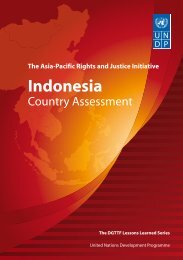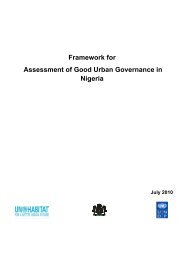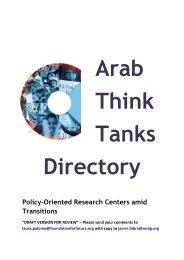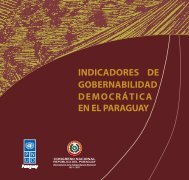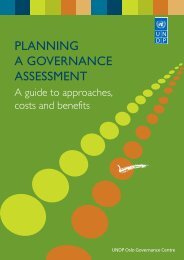A Users' Guide to Measuring Local Governance
A Users' Guide to Measuring Local Governance
A Users' Guide to Measuring Local Governance
You also want an ePaper? Increase the reach of your titles
YUMPU automatically turns print PDFs into web optimized ePapers that Google loves.
imparting information, these meetings also serve<br />
as an important mechanism <strong>to</strong> solicit the views of<br />
the public on issues of importance <strong>to</strong> local<br />
government. Such meetings may help both <strong>to</strong><br />
disseminate governance assessment results and <strong>to</strong><br />
provide a mechanism for citizens <strong>to</strong> draw attention<br />
<strong>to</strong> deficiencies and <strong>to</strong> propose measures <strong>to</strong> raise<br />
governance performance.<br />
Oversight committees and citizen advisory boards:<br />
Oversight committees are external committees<br />
that oversee the operations and activities of<br />
specific local government committees such as<br />
finance, public works, health and education. These<br />
committees perform an important role in<br />
gathering information on the functioning of<br />
individual departments and ensuring, through<br />
their oversight and questioning of management<br />
officials, that corrupt practices do not take place.<br />
Citizen advisory boards are also structured around<br />
specific issues but have a looser advisory role than<br />
the more formalised role of the oversight<br />
committee, with members who are less likely <strong>to</strong> be<br />
employees of the authority. Members of these<br />
committees and boards combine relevant<br />
expertise of the subject with active participation in<br />
the local community. For these reasons, they are<br />
ideally suited <strong>to</strong> dissemination and response <strong>to</strong><br />
governance assessment results.<br />
<strong>Local</strong> Anti-Corruption Agencies: In response <strong>to</strong> the<br />
growth of local government responsibilities<br />
associated with decentralization programmes,<br />
anti-corruption agencies have often been created<br />
at the local level. These can serve as watchdog for<br />
local government entities; <strong>to</strong> provide an effective<br />
vehicle <strong>to</strong> disseminate information regarding<br />
the ethics rules and regulations pertaining <strong>to</strong><br />
government employment; <strong>to</strong> study and draft good<br />
governance policies and <strong>to</strong> ensure that those in<br />
government who breach the public trust are held<br />
accountable for their actions. A proactive<br />
community/grassroots outreach programme is a<br />
key element of such local anti-corruption agencies.<br />
The dissemination by such agencies of the results<br />
of governance assessments can play a major part<br />
in raising citizen awareness of major deficiencies in<br />
local governance.<br />
Participa<strong>to</strong>ry Budgeting: Participa<strong>to</strong>ry Budgeting is<br />
a significant innovative practice that can help <strong>to</strong><br />
enhance participation and improve downward<br />
accountability in the administration of financial<br />
matters. In particular, by raising citizen participation<br />
beyond the elec<strong>to</strong>ral process through the<br />
mechanism of thematic and neighbourhood<br />
meetings, participa<strong>to</strong>ry budgeting can help <strong>to</strong><br />
enhance local democratic culture, nurture civic<br />
engagement, and stimulate the development of<br />
social capital. Although concerned primarily with<br />
ensuring that there is a better fit between the<br />
allocation of local financial resources and citizens<br />
expressed needs, the participa<strong>to</strong>ry mechanisms<br />
employed can also help <strong>to</strong> address deficiencies as<br />
expressed by the results of local governance<br />
performance assessment.<br />
This chapter highlights the most pressing issues<br />
that users of assessments of local governance have<br />
identified. Its content is based on telephone<br />
interviews with more than twenty representatives<br />
from the practitioner community, including<br />
intergovernmental, donor, government, research<br />
and civil society communities (see interviewees’<br />
list in acknowledgements section). The semistructured<br />
interviews covered the assessments<br />
and indica<strong>to</strong>rs that they made use of, the role of<br />
these in development policy and planning<br />
processes, and their major strengths and<br />
weaknesses. Six major issues were highlighted by<br />
the interviewees and are presented here, in each<br />
case with an associated checklist of ‘good practice’<br />
guidelines.<br />
22<br />
From Framework for Promoting Transparency at the <strong>Local</strong> Level, UN-HABITAT<br />
http://ww2.unhabitat.org/cdrom/TRANSPARENCY/html/transpl.html<br />
A Users’ <strong>Guide</strong> <strong>to</strong> <strong>Measuring</strong> <strong>Local</strong> <strong>Governance</strong> 23




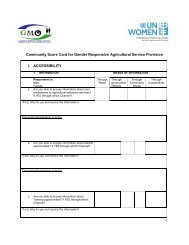

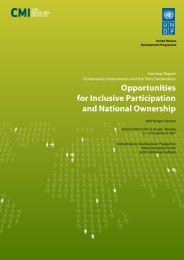
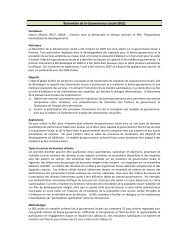
![GuÃa del Usuario ] - Governance Assessment Portal](https://img.yumpu.com/44740603/1/190x253/gua-a-del-usuario-governance-assessment-portal.jpg?quality=85)
